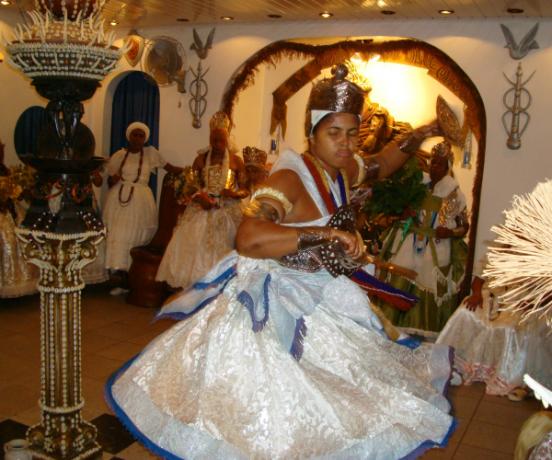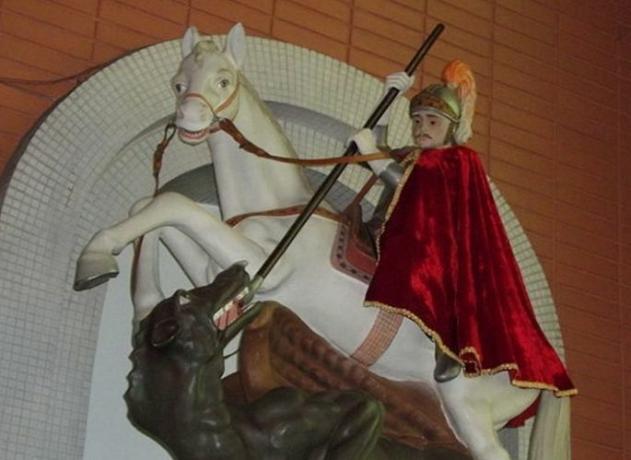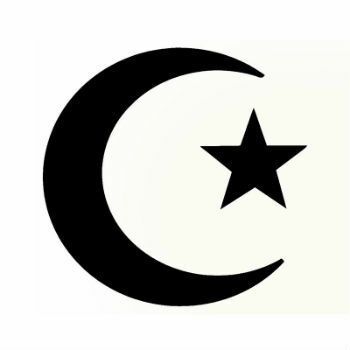ogun is a deity of African origin (orisha) worshiped in Afro-Brazilian religions, such as Umbanda and Candomblé. Ogun is the orixá Warrior, known for his courage and strength. In fact, in Yoruba, a West African ethnic-linguistic group, Ogun means war.
someone is lord of metallurgy, having control over iron and steel and all tools made with these materials, such as the spear, the hammer, the knife, the horseshoe and the hoe. He is an orixá associated with struggle and work, being a patron of both the military and manual workers (especially blacksmiths).
Its symbol is the sword and its colors are red (in Umbanda), blue, white and green (in Candomblé). In the syncretism of Afro-Brazilian religions, Ogun is associated with Saint George, the cult Saint Warrior of the Catholic religion. Therefore, Ogun's day is celebrated on the same day as St. George: April 23. your weekday is Tuesday.

Although he is not an agricultural orixá, Ogun has a connection with planting and harvesting, because he was the one who made the first tools used in agriculture, such as the hoe and sickle.
In Candomblé and Umbanda, Ogun is associated with São Jorge. It is not uncommon for deities from African religious traditions to be represented by Catholic saints, since in the past the worship of orixás was prohibited in Brazil. Therefore, enslaved blacks began to associate many of the orixás with Catholic saints, a cultural phenomenon known as religious syncretism.

Know the meaning of the expression Save Jorge.
Ogun's Story
According to Yoruba mythology, the supreme god Olorum (or Olodumare) created the orishas. The first of them, Oxalá, created the world and humanity.
In this primordial land, called Ilê-Ifé, human beings and orixás lived side by side. There was a time when the population increased and there was a need to create new planting areas. The orixás got together to decide what to do and some of them even tried to do the job: without success.
That's when Ogun took action. Wielding a machete, he entered the woods and cleared the land for farming. For this reason Ogun became known as the orisha that opens the paths.
The other orixás watched all that, admired, especially for the efficiency of the material used by Ogun: iron. Until then, few knew the iron secret, and Ogun was one of them.
The orixás insisted that Ogun reveal the secret of that material, perfect not only for agriculture, but also for hunting and warfare. The warrior orixá only agreed to share his secret when he was offered the reign of Ifé. Ogun then became king.
One day, however, Ogun went hunting and took a long time to return. When he returned, he was very dirty and with torn clothes, which made a very bad impression on his subjects. The orishas met and decided to remove Ogun from his role as governor.
Deeply resentful, Ogun decided to leave, taking his iron tools with him. He chose a distant place called Irê, where he built his house. Since then, human beings have been very grateful to this orixá. In the end, it was Ogun who shared with us the gift of steelmaking, in addition to teaching hunting forms and war tactics.
Characteristics of Ogun's children
In African-based religions, people are guided by some orixás. The so-called Head Orixá is the one by which people call themselves children and, consequently, have their characteristics in personality and even physically. Ogun's children generally have some of these characteristics:
- They are usually people who are easily irritated and have very strong opinions on what they believe;
- They are impulsive;
- They are usually people with strong physiques;
- They consider sport a form of leisure and even a way to channel all their energy;
- They are immediate people and considered quarrelsome;
- They are determined about what they want and faithfully follow their values.
See too:
- Definition of Orixás
- Definition of Oshun
- Definition of Shango
- Definition of Oxossi
- meaning of exu
- meaning of Iemanja
- Definition of Candomblé
- All about Umbanda

